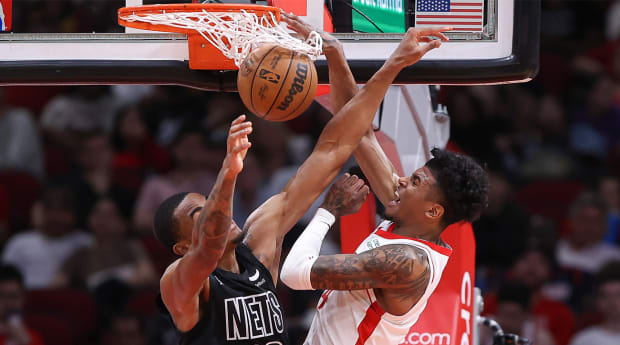So much of the focus this NBA offseason has been on the contenders and what all they’re doing to make pushes to land in the winner’s circle next summer. The Suns got Bradley Beal, the Warriors unloaded Jordan Poole and snagged Chris Paul, the Celtics landed Kristaps Porziņģis and their archrivals, the Heat, are trying to make a trade for superstar Damian Lillard.
But two or three contention layers beneath that, the 22-win Rockets made waves of their own, agreeing to pay one-time All-Star Fred VanVleet more than $43 million per year over the next three seasons and handing former Grizzlies wing Dillon Brooks an $80 million deal over four years. Longtime vet Jeff Green, who will turn 37, signed with the Rockets for two years and $16 million.

Troy Taormina/USA TODAY Sports
They weren’t acquisitions for superstars, obviously. But in spending so much on win-now veterans, Houston is clearly serious about trying to change its stripes from the past few years, when it was seen as a place where development often lacked. In a way, these moves indicate a willingness to pull the best out of the young talent on this roster, particularly guard Jalen Green.
Green, still just 21, increased his scoring average from 17.3 points per contest as a rookie to 22.1 points in his second season. But his efficiency from both two- and three-point range decreased, sending his effective field goal percentage south from 50.8% in his first year to 48.5% last season, leaving him tied for last in the NBA among players with at least 1,200 shot attempts.
The Rockets’ puzzling style of play—they were the slowest-pace team in the league after grabbing a defensive rebound despite having the league’s youngest roster—didn’t necessarily do Green any favors. Green certainly called his own number plenty, too, taking 10% of his shot attempts from the long-midrange portion of the floor while hitting just 36.8% of them, per Basketball Reference.
But dig deep enough into his metrics, and you’ll find the thing that was perhaps most concerning: In his second season with guard Kevin Porter Jr., Green shot just 33.5% (117-of-349) off of his passes, an enormous drop from the season before, in which he made 42.1% (118-of-280). Despite taking the 69 extra attempts in the second season, Green managed to make more shots off Porter’s passes during that first season with him.
It was always fair to wonder whether the two played well off each other, or whether the offense was best suited to run through the two of them. For example, skilled big Alperen Şengün has shown enough flashes to be a hub of the attack far more than he’s been in the past.
Yet things will clearly shift this season, with VanVleet—someone who’s played alongside Kawhi Leonard, Pascal Siakam and Kyle Lowry—leading the offense. It should reduce at least some of the pressure on Green by giving him a more cerebral guard and one who’s more committed defensively. And Brooks, for all his explosive, controversial quotes, fits the same bill from a defensive standpoint. Even No. 4 pick Amen Thompson, a skilled ballhandler and playmaker, can potentially help set up Green a bit more with better looks.
Understandably, many fans throughout the league raised their eyebrows when the Rockets spent the amount they did in free agency. Much of that is steeped in wanting to win sooner, yes. But some of it also stems from wanting to invest in a highly talented potential star like Green and hoping that he’ll progress by having better, more team-oriented players around him.







